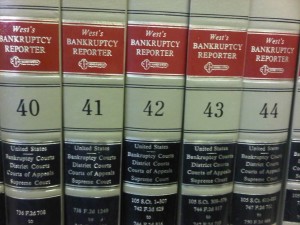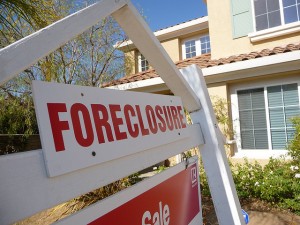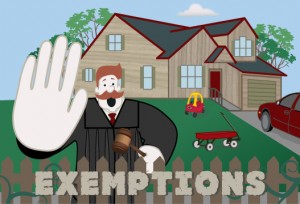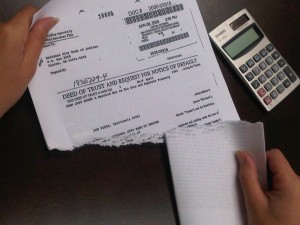 Bankruptcy is a court authorized procedure that helps honest people handle serious debt problems by either:
Bankruptcy is a court authorized procedure that helps honest people handle serious debt problems by either:
- eliminating the debts, or
- reorganizing the debts into manageable monthly payments.
Authorized by the United States Constitution, Article 1, Section 8, bankruptcy is a recognition in our country that sometimes bad things happen to good people. The recent recession and current economic slowdown have caused millions of lost jobs. Many people have been laid off, suffered a reduction of pay, or reduction of their retirement funds. The Wall Street banks, including the ones that got bailed out by taxpayer dollars, have cut back drastically in lending to the extent that individuals and small businesses can’t get money to cover the slow periods. Adjustable mortgage loans have reset and prevented homeowners from being able to make the increased payment triggering foreclosures. And then their lenders refuse to refinance the loans. Other good people get hurt, sick, divorced, sued, or grow old with a fixed income, all of which can stop or reduce their ability to pay back debts. How do they survived?
Bankruptcy Is a Safety Net
Bankruptcy provides a safety net for people to get on with their lives, jobs, and businesses without losing everything they have worked so hard for. First, it STOPS CREDITORS. Filing bankruptcy will cause a federal restraining order, called the “Automatic Stay,” to be issued immediately upon filing that will stop all collection efforts by creditors including telephone calls, collection letters, lawsuits, garnishments, or foreclosures and trustee sales. The Automatic Stay will even stop the IRS from collecting taxes and in some cases the bankruptcy may permanently eliminate income taxes all together. What happens next depends on which Chapter of the Bankruptcy Code you qualify for to fit your personal financial circumstances. I’ll discuss both consumer options Chapter 7 and Chapter 13.
Chapter 7 Eliminates Debts
Chapter 7 is designed to eliminate your obligation to pay all unsecured debt, that is, debt that is not secured by your property. It usually consists of credit cards, medical bills, deficiency on repossessed cars, personal loans, and the like. The goal of Chapter 7 is to “get a fresh start” financially. However, you must be very careful to get a good experienced lawyer before you attempt a Chapter 7. This is because Chapter 7 is, in reality, a liquidation. This means that care must be taken to insure that all your property including clothes, furniture, tools, car, house, etc., is protected BEFORE you file Chapter 7. Your attorney protects all your property through the process of claiming “bankruptcy exemptions.” These exemptions are a collection of state and federal laws that allow you to protect your assets, but please remember that these exemptions are not automatic, and you and your lawyer must claim them specifically in writing. In my 30 years of bankruptcy experience, it is very rare for people to lose any property they want to keep IF proper legal precautions are taken. Chapter 7 normally last about 4 1/2 months and at the end you receive from the Court a Bankruptcy Discharge certificate verifying that you have no legal obligation to pay the discharged debts. Please keep in mind that not all debts are discharged in Chapter 7 including student loans, family support, court fines, etc. There is also a “means test” that I’ll discuss in a subsequent post which everyone must pass in order to file Chapter 7.
Chapter 13 Reorganizes Your Debt
A Chapter 13 plan is a court approved repayment plan that allows you to repay your creditors a monthly payment amount that fits your personal financial situation. It basically subtracts your reasonable living expenses like housing, food, clothes, transportation, insurance, charitable contributions, etc., from your net (after tax) monthly income, and uses the difference, called your “disposable income,” to make your monthly Chapter 13 plan payment to a court trustee who in turn pays your creditors. These plans usually last a minimum of 36 months but could last up to 60 months. If your monthly plan payment paid out over the period of the plan was enough to repay, for example, 20% of your unsecured debts, and that payment was your “best effort,” then that’s all you would have to repay. And at the end of the plan, the other 80% of your unsecured debt would be discharged. The bankruptcy court’s automatic stay would protect you from the creditors the whole time you are in your Chapter 13 plan. Other things that might be accomplished in a Chapter 13 (and not Chapter 7) include:
- stop a foreclosure or trustee’s sale, and cure the default by paying the mortgage arrears in the plan;
- strip off the lien of a second mortgage if your house is completely underwater, i.e., you owe more on the first mortgage than the house is worth;
- “cram down” or reduce your car balance to what the car is worth and reduce the car loan interest rate;
- protect a cosigner; or
- protect a non-exempt asset , etc.
Chapter 13 law and related procedures are very complex and require the assistance of an attorney experienced in Chapter 13.
What to Do Next?
Contact my office at 440 Civic Center Drive, Vista, CA 92084-6144, for an office meeting with me so I can personally analyze your financial circumstances. I’ll see if you qualify for either Chapter 13 or Chapter 7 and, if you do, help you decide which one may offer you the most help. There is no charge for your first office visit. I help people with bankruptcy from all over North San Diego County. Our phone is 760-758-3043.
 Gas Prices Hit Historic Highs in California
Gas Prices Hit Historic Highs in California




